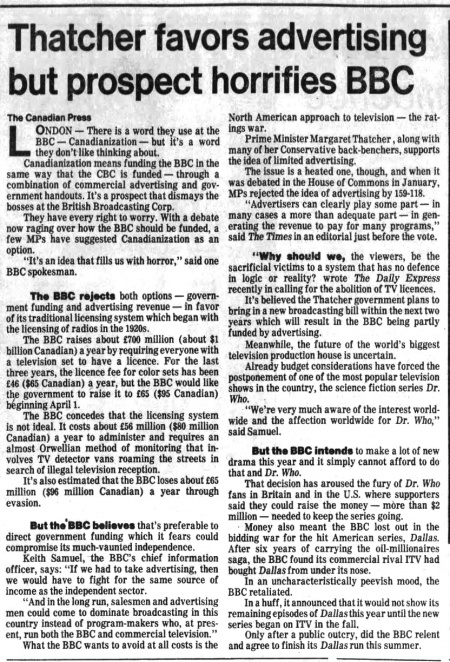Difference between revisions of "Thatcher favors advertising but prospect horrifies BBC"
John Lavalie (talk | contribs) m (Text replacement - "| categories = 1985 hiatus" to "| categories = Hiatus (1985)") |
John Lavalie (talk | contribs) m (Text replacement - "| categories = Hiatus (1985)" to "| categories = Hiatus") |
||
| Line 11: | Line 11: | ||
| type = | | type = | ||
| description = | | description = | ||
| − | | categories = Hiatus | + | | categories = Hiatus |
| moreTitles = | | moreTitles = | ||
| morePublications = | | morePublications = | ||
Latest revision as of 23:57, 16 August 2019
- Publication: Times Colonist
- Date: 1985-03-11
- Author:
- Page: B6
- Language: English
LONDON — There is a word they use at the BBC — Canadianization — but it's a word they don't like thinking about. Canadianization means funding the BBC in the same way that the CBC is funded — through a combination of commercial advertising and government handouts. It's a prospect that dismays the bosses at the British Broadcasting Corp.
They have every right to worry. With a debate now raging over how the BBC should be funded, a few MPs have suggested Canadianization as an option.
"It's an idea that fills us with horror," said one BBC spokesman.
The BBC rejects both options — government funding and advertising revenue — in favor of its traditional licensing system which began with the licensing of radios in the 1920s.
The BBC raises about COO million (about $1 billion Canadian) a year by requiring everyone with a television set to have a licence. For the last three years, the licence fee for color sets has been £46 ($65 Canadian) a year, but the BBC would like the government to raise it to f65 ($95 Canadian) beginning April 1.
The BBC concedes that the licensing system is not ideal. It costs about £56 million ($80 million Canadian) a year to administer and requires an almost Orwellian method of monitoring that involves TV detector vans roaming the streets in search of illegal television reception.
It's also estimated that the BBC loses about £65 million ($96 million Canadian) a year through evasion.
But the BBC believes that's preferable to direct government funding which it fears could compromise its much-vaunted independence.
Keith Samuel, the BBC's chief information officer, says: "If we had to take advertising, then we would have to fight for the same source of income as the independent sector.
"And in the long run, salesmen and advertising men could come to dominate broadcasting in this country instead of program-makers who, at present, run both the BBC and commercial television."
What the BBC wants to avoid at all costs is the North American approach to television — the ratings war.
Prime Minister Margaret Thatcher, along with many of her Conservative back-benchers, supports the idea of limited advertising.
The issue is a heated one, though, and when it was debated in the House of Commons in January, MPs rejected the idea of advertising by 159-118.
"Advertisers can clearly play some part — in many cases a more than adequate part — in generating the revenue to pay for many programs," said The Times in an editorial just before the vote.
"Why should we, the viewers, be the sacrificial victims to a system that has no defence in logic or reality? wrote The Daily Express recently in calling for the abolition of TV licences.
It's believed the Thatcher government plans to bring in a new broadcasting bill within the next two years which will result in the BBC being partly funded by advertising.
Meanwhile, the future of the world's biggest television production house is uncertain.
Already budget considerations have forced the postponement of one of the most popular television shows in the country, the science fiction series Dr. Who.
"We're very much aware of the interest worldwide and the affection worldwide for Dr. Who," said Samuel.
But the BBC intends to make a lot of new drama this year and it simply cannot afford to do that and Dr. Who.
That decision has aroused the fury of Dr. Who fans in Britain and in the U.S. where supporters said they could raise the money — more than $2 million — needed to keep the series going.
Money also meant the BBC lost out in the bidding war for the hit American series, Dallas. After six years of carrying the oil-millionaires saga, the BBC found its commercial rival ITV had bought Dallas from under its nose.
In an uncharacteristically peevish mood, the BBC retaliated.
In a huff, it announced that it would not show its remaining episodes of Dallas this year until the new series began on ITV in the fall.
Only after a public outcry, did the BBC relent and agree to finish its Dallas run this summer.
Disclaimer: These citations are created on-the-fly using primitive parsing techniques. You should double-check all citations. Send feedback to whovian@cuttingsarchive.org
- APA 6th ed.: (1985-03-11). Thatcher favors advertising but prospect horrifies BBC. Times Colonist p. B6.
- MLA 7th ed.: "Thatcher favors advertising but prospect horrifies BBC." Times Colonist [add city] 1985-03-11, B6. Print.
- Chicago 15th ed.: "Thatcher favors advertising but prospect horrifies BBC." Times Colonist, edition, sec., 1985-03-11
- Turabian: "Thatcher favors advertising but prospect horrifies BBC." Times Colonist, 1985-03-11, section, B6 edition.
- Wikipedia (this article): <ref>{{cite news| title=Thatcher favors advertising but prospect horrifies BBC | url=http://cuttingsarchive.org/index.php/Thatcher_favors_advertising_but_prospect_horrifies_BBC | work=Times Colonist | pages=B6 | date=1985-03-11 | via=Doctor Who Cuttings Archive | accessdate=8 February 2026 }}</ref>
- Wikipedia (this page): <ref>{{cite web | title=Thatcher favors advertising but prospect horrifies BBC | url=http://cuttingsarchive.org/index.php/Thatcher_favors_advertising_but_prospect_horrifies_BBC | work=Doctor Who Cuttings Archive | accessdate=8 February 2026}}</ref>
